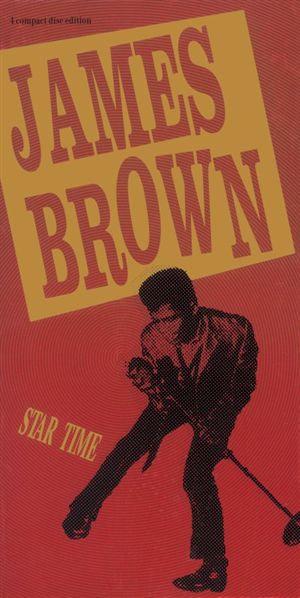
Figuring out James Brown is an inexact science:
·He had 92 singles on the top 100 between 1959 and 1977, 97 if you count tracks by Nat Kendricks & The Swans, and by The JBs.
·Try Me shows up twice
·Think shows up 4 times
·There are live versions and studio versions
·30 songs have “Part 1” appended to them
·Several songs are listed as “Part 1 and Part 2.”
·For Let A Man Come In And Do The Popcorn, Parts 1 and 2 are listed separately
·There is one song listed as Part 3, though no parts 1 or 2 are evident
·10 songs are listed by Whitburn as instrumental, including Night Train and Ain’t It Funky Now, neither of which are instrumentals.
·It’s a big big mess.
I have made no effort to make sense of all this, or to figure out exactly which versions I have. I list the titles with the part numbers attached more or less arbitrarily, according to what I’ve written down on the cassette labels. Don’t you try to make sense of it either.
All but one track comes from the Star Time box set. That one track is I Got The Feeling, which I don’t know why they left it off the box set. It came from a 20 track Greatest Hits. I picked that one up at Sam The Record Man, but it’s been superseded by Star Time, all but one track, anyway. I left off the superfluous tracks; there were not that many.
I grew up hearing James Brown on the radio, right back to Papa’s Got A Brand New Bag. But considering how many songs he’s got listed in Whitburn, I heard surprisingly few: Cold Sweat, I’ve Got You (I Feel Good), It’s A Man’s Man’s Man’s World. I remember watching him on Ed Sullivan, his shtick was a riot. Later I read his autobiography. The most graphic recollection I have is how he would fine members of his entourage if they were out of step on stage. He would dance over and count out the number of dollars on his fingers one by one, and it looked just like part of the act.
James Brown:
•
Please Please Please – “You done me wrong” he says, so why is he the one begging? And how can 3 words and a few notes carry so much emotional weight? The song only bubbled under at number 105 on the hot 100, but it reached number 5 on the R & B chart. That doesn’t tell the story though; the real story is that all those budding musicians were listening. Notable covers are by The Who, on their first album, and by Mitch Ryder & The Detroit Wheels. Brown could have fashioned his entire career on this one song, and in a way he did.
•
Why Do You Do Me – A Please Please Please clone, but without the power.
•
Try Me – Advertising principals applied to prospective romance. Brown’s first pop hit, from the winter of 1959.
•
Tell Me What I Did Wrong – A challenge, walk right up to me baby.
•
Bewildered – He may be confused, but he has a heck of definite way of saying so. A brilliant ballad performance from the spring of 1961.
•
Good Good Lovin’ – A great rockin’ piece of soul, with great drums and great sax. Never made the charts. Go figure…
•
I’ll Go Crazy – How we use insanity as a metaphor for love. This song reached the top 70 in the spring of 1966, but it was released much earlier. It was a favourite for bands to cover – The Buckinghams come to mind, and The Blues Magoos. There were a million others.
•
I Know It’s True – A simple statement. I found someone who loves me. How does he know it’s true? Not sure, but it probably has something to do with the sax…
•
(Do The) Mashed Potatoes, Pt. 1 – If I were doing this right, this would be in a separate entry, under Nat Kendrick & The Swans, because that’s the name this was released under, and Whitburn has it listed separately, without a note even as to its true auteur. The song was also a hit, and a bigger one, for The Dartells, as Hot Pastrami. From the winter of 1960, when dances about food were all the rage, apparently.
•
Think – Not The Aretha Franklin song. 4 different versions of this song were on the chart, 2 in 1974, one in 1967, and the original in the summer of 1960.
•
Baby You’re Right – Every release seemed to bring him closer to some kind of soul nirvana, and no reference is intended to Kurt Cobain. From the fall of 1961.
•
Lost Someone – The expression usually used in the case of death is employed in this ballad in the romantic sense, and it together with the mournful tone it puts the story at a whole new level. From the winter of 1962.
•
Night Train – The grooviest train ever to hit the top 40. By adding vocals to a song that was originally an instrumental (by Jimmy Forrest, in case you’re wondering) the song becomes a journey to transcendence. From the spring of 1962.
•
I’ve Got Money – And now I need love, sings our hero. Straighter words were never sung.
•
I Don’t Mind – Another favourite for cover versions, another one done by The Who. This song was a hit in the fall of 1961, but this is a live version.
•
Prisoner Of Love – An old standard, and Dave March describes Brown’s recording as “a man fighting his way out of a fog” and I can’t top his description. James Brown with strings sounds almost as discordant as Ray Charles with strings. From the summer of 1963.
•
Out Of The Blue – This sounds more like one of those early 60s pop ballads than Brown’s songs tend to do. Not The Band song.
•
Devil’s Den – An instrumental. If I’m not mistaken, Brown plays organ. Not too satanic sounding, really.
•
Out Of Sight – No she’s not standing behind the fence. James uses this to-be hippie epithet as the superlative we all know and love. Them covered this. From the fall of 1964.
•
Grits – Grits are apparently slower than mashed potatoes. Another instrumental.
•
Maybe The Last Time – Not to be confused with The Last Time by The Stones.
•
Papa’s Got A Brand New Bag, Part 1 – Those by whom I was surrounded, specifically adolescent girls, and I was not yet quite an adolescent, puzzled as to the meaning of the title. Doesn’t make sense, they opined. They were wrong of course. It makes more sense than even James Brown could have realized at the time. The song is a monument in the history of R & B. In the words of Dave Marsh: “The only way Papa’s Got A Brand New Bag could be more bonerattling would be if James Brown himself leaped from your speakers, grabbed you tight by the shoulders and danced you round the room, all the while screaming into your face.” A picturesque image indeed. The B side of the single featured part 2, and the Star Time collection, in addition to the single version, combined part 1 and part 2 for a first time ever release of the whole song in one shot. The length dilutes it though, stick to part 1. From the late summer of 1965.
•
I Got You (I Feel Good) – Picking up the thread, the “bag,” and running with it. The bass alone is worth the price. The biggest hit Brown ever had, this reached number 3 in the winter of 65 / 66.
•
Ain’t That A Groove – Stepping back a bit from the severe groove of the previous hits, Ain’t That A Groove swings a bit harder, uses a female vocal chorus, and sings of the pleasures of the flesh. From the spring of 1966.
•
It’s A Man’s Man’s Man’s World – Kind of a spoof, from the movie It’s A Mad Mad Mad World, but it’s far too unfunny to be a spoof. Totally over the top. Brown sings, with total seriousness, of all of man’s inventions, he makes this, he makes that, and without missing a beat tells that when man’s done making stuff, he makes money. Totally chauvinistic, totally self-contradictory, dead serious. Back when this was a hit, you could get away with this stuff. From the spring of 1966.
•
Money Won’t Change You, Part 1 – The beginning of the James Brown lecture series. From the summer of 1966.
•
Don’t Be A Dropout – And here is the next lecture. If your parents sounded this cool when they lectured you, you’d do everything they wanted. From the fall of 1966.
•
Bring It Up (Hipster’s Avenue) – From the winter of 1967.
•
Let Yourself Go – Not a song about gaining weight. From the summer of 1967.
•
I Got The Feeling – From the spring of 1968, one can be forgiven for thinking that he is listening to Cold Sweat.
•
Cold Sweat – Dave Marsh calls this “the birth of modern funk,” explaining that Brown did away with the chord change. I guess that’s a fairly good way to put it. He also says that this is as “resistible as gravity,” another good way to put it. From the summer of ’67. There is a superb cover by Mongo Santamaria.
•
Get It Together – Another don’t drop out of school song. From the fall of 1967. Fast funk, almost every song was to do from then on sounded like this.
•
I Can’t Stand Myself (When You Touch Me) – This has to be the strangest title ever for a love song, but a love song it is, not that you’d want to slow dance to it. From the winter of 1968.
•
There Was A Time – A song about dancing, though, in a way, all his songs are about dancing. From the winter of 1968, the B side of I Can’t Stand Myself.
•
Licking Stick – Licking Stick – This song brings back memories – not of when it was a hit, which was the summer of 1968, because I never heard it then. No. I remember when I picked up the single back around ’84, around the time I’d first discovered Pyramid Records. I can still smell the dust. I’ve since replaced the single with the CD copy, but I can still hear the scratches. There is a cover on a Ventures album called The Horse, which seems to make sense, but there isn’t anything about horses on this song, the title notwithstanding. One can only imagine who is licking what.
•
Say It Loud - I’m Black And I’m Proud – Along with The Impressions, James Brown was among the first to declaim black pride on the top 40. Curtis Mayfield stuck to gospel, Brown got into a funky groove, made Malcom X sound like fun. From the fall of 1968.
•
Give It Up Or Turnit A Loose – I can’t tell what the difference is between one and the other, but James is adamant either way. From the winter of 1969.
•
I Don’t Want Nobody To Give Me Nothing (Open Up The Door, I’ll Get It Myself) – Not only were chord changes superfluous, but with such a title who needed lyrics. From the winter of 1969.
•
Hot Pants (She Got To Use What She Got To Get What She Want), Part 1 – Say no more. From the summer of 1971.
•
Mother Popcorn – 10 years after the mashed potatoes we had the popcorn. That makes a kind of perverse sense I suppose. We had to get through the bugaloo and the shingaling first. From the summer of 1969.
•
Funky Drummer – Highlights the organ more than the drummer. From the summer of 1970.
•
Get Up (I Feel Like Being) A Sex Machine – This is the opposite of Marvin Gaye, who ended writing slick come ons like Let’s Get It On. No such subtlety for Mr. Brown, who reduces the whole think to some kind of funk-driven stud automation. From the summer of 1970.
•
Super Bad – The title of at least one K-Tel album that featured early 70s R&B. “Bad” in this case means “good.” From the fall of 1970.
•
Talking Loud And Saying Nothing – A put down song, but you know that from the title. From the winter of 1972.
•
Get Up, Get Into It, Get Involved – This is another song whose title obviates the need to listen to the actual song, not that Brown isn’t worth listening to. From the winter of 1971.
•
Soul Power – Another instance of pure James Brown funk, from the winter of 1961.
•
Brother Rapp / Ain’t It Funky Now – The latter was a hit in the winter of 1969 / 1970. Brother Rapp was a hit in the spring of 1970. Brother Rapp, it presaged a musical movement that would not exist for another 20 years. This is a live medley.
•
Make It Funky, Pt. 1 – You can take this one at face value, and I particularly like it when he starts listing vegetables toward the end. No, I don’t understand it either, but on a certain level I do. From the fall of 1971.
•
It’s A New Day – “It’s star time ladies and gentleman,” says the compère off the top, giving the collection its name. This is a live version of a song that was a hit in the winter of 1970. Maybe the live version was the hit. I don’t know, because I never heard it on the radio.
•
I Got Ants In My Pants And I Want To Dance, Pt. 1 – From the winter of 1973, a song that sums up a big part of who James Brown was.
•
King Heroin – A hardcore mainline anti-drug song. Non-ambiguous. Along with staying in school, this was one of his crusades. From the winter of 1972.
•
There It Is, Pt 1 – I’m not sure what it is, but there it is. There’s a point, anyway, when the words become superfluous, and by this time he had passed that point long ago. From the summer of 1972.
•
Public Enemy #1, Pt. 1 – Another anti-drug song. The way he delivers this, he leaves no doubt about how he feels.
•
Get On The Good Foot – As if he had a bad foot. If you can listen to this without dancing then you’re dead. From the fall of 1972.
•
I Got A Bag Of My Own – Picking up, lyrically at least, where Papa’s Got A Brand New Bag left off, but musically it’s of a piece with what he was doing in the early 70s. From the winter of 72 / 73.
•
Doing It To Death – Technically this is another track that doesn’t belong here. The record was released by The JBs, or by Fred Wesley & The JBs, depending on who you ask. But it’s definitely James Brown doing the vocals, if not exactly singing. And the JBs were, in any event, his backing band. From the summer of 1973.
•
The Payback – Whom is he paying back? For what? There is a sinister ambience here, a bit like a spy thriller. In any event James ain’t happy. From the spring of 1974.
•
Papa Don’t Take No Mess, Pt. 1 – More funk, from the fall of 1974.
•
Stoned To The Bone, Pt.1 – What bone would that be, James? I would comment on the appropriateness of the title and subject matter given his avowed anti-drug stance, but it seems that title is deceptive. This seems to be naught but a funky love song. From the winter of 1974.
•
My Thang – What “thang” would that be James? From the summer of 1974.
•
Funky President (People It’s Bad) – I honestly don’t know whether the “bad” in the title is bad bad or bad good. Either way, there doesn’t seem to be much politics in this track. From the winter of 1974 / 1975.
•
Hey (I Need To Be Loved Loved Loved) – There is something “sampled” on this, and I can’t place it. Oh, curse old age!
•
Get Up Offa That Thing (Release The Pressure) – Nobody, but nobody, came up with so many ways to say the same thing, not even Chuck Berry. Brown tenaciously clung to funk in the face of disco. A hit in the fall of 1976.
•
Bodyheat, Pt. 1 – Well, there’s a bit of disco in this, and there’s a bit of gospel, at least in the lyrics (“gotta go to church, y’all”). From the winter of 1977. James Brown’s final top 100 hit.
•
It’s Too Funky In Here – Probably his best song title of all, in a what is definitely an impressive collection.
•
Rapp Payback (Where Is Moses), Pt. 1– He was really starting to recycle his ideas here…
•
Unity, Pt. 1 – We bid adieu, just as James Brown gets into electronics…
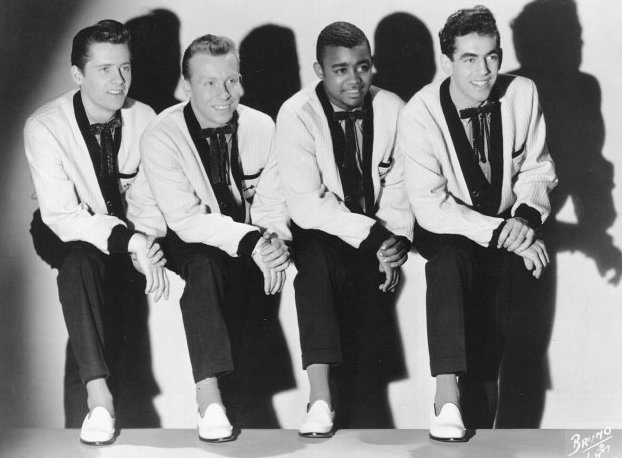 Named after the Chevy? Not likely. At least The Fleetwoods had the class not to name themselves after a Cadillac. This comes from The Doo-Wop Box.
Named after the Chevy? Not likely. At least The Fleetwoods had the class not to name themselves after a Cadillac. This comes from The Doo-Wop Box. Tommy Dee has the special privilege of having no entry in Wikipedia. It’s odd, because his one and only hit record is in there, and he was, I understand, active in country music for about 30 years before he died in 2007.
Tommy Dee has the special privilege of having no entry in Wikipedia. It’s odd, because his one and only hit record is in there, and he was, I understand, active in country music for about 30 years before he died in 2007.
 I remember a Dave “Baby” Cortez album displayed in the show window of Roxie’s, a store that gained some notoriety for its creative use of female manikins. Don’t ask.
I remember a Dave “Baby” Cortez album displayed in the show window of Roxie’s, a store that gained some notoriety for its creative use of female manikins. Don’t ask. Frankie Ford, who is still alive and well and rocking New Orleans style, had a short career on the pop charts – 5 singles on the top 100 over 3 years (1969 – 1961), only one of which made it higher than 75 (it reached 14).
Frankie Ford, who is still alive and well and rocking New Orleans style, had a short career on the pop charts – 5 singles on the top 100 over 3 years (1969 – 1961), only one of which made it higher than 75 (it reached 14).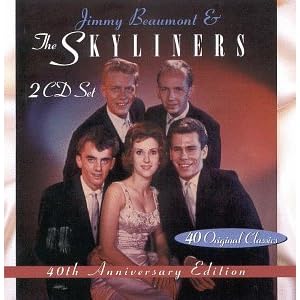 40 odd tracks seems like a lot for a group that were only ever known for 1 song, and it’s true, it is a lot of tracks. The group actually placed 6 songs in the top 100, 3 of them in the top 40.
40 odd tracks seems like a lot for a group that were only ever known for 1 song, and it’s true, it is a lot of tracks. The group actually placed 6 songs in the top 100, 3 of them in the top 40.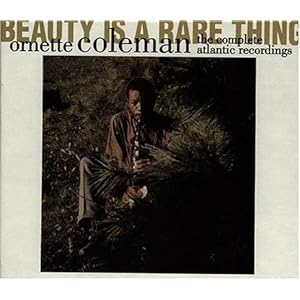 More jazz. When my jazz-fan friend learned that I was listening to this he suggested that I stop at The Shape Of Jazz To Come. I am not so faint-hearted, I responded. A little avant garde never scared me. and it’s true. It doesn’t scare. That doesn’t mean that I can make head or tail of it.
More jazz. When my jazz-fan friend learned that I was listening to this he suggested that I stop at The Shape Of Jazz To Come. I am not so faint-hearted, I responded. A little avant garde never scared me. and it’s true. It doesn’t scare. That doesn’t mean that I can make head or tail of it.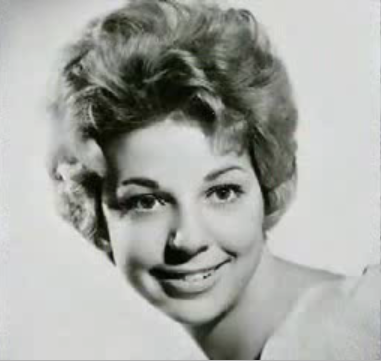 Her real name was Geraldine, and she recorded as Geraldine Stevens also. As Dodie, she had 5 top 100 singles, none of which made it higher than number 60, except for Pink Shoelaces, which reached number 3. She was 13 when she recorded it.
Her real name was Geraldine, and she recorded as Geraldine Stevens also. As Dodie, she had 5 top 100 singles, none of which made it higher than number 60, except for Pink Shoelaces, which reached number 3. She was 13 when she recorded it. K-Tel and Rondo would gather up sad songs into collections called Tear Jerkers and that kind of thing. The quality was never great, and you had to be careful or you’d end up with a “rerecording by one or more members of the original group.” Some of the most notorious collections were silly; they would be called Loony Tunes and they were the butt of many a joke. Finding old copies in second hand shops, though, was a great source of otherwise unavailable songs. And, if blogs are any indication, K-Tel has actually acquired a kind of retro cool. It had to happen…
K-Tel and Rondo would gather up sad songs into collections called Tear Jerkers and that kind of thing. The quality was never great, and you had to be careful or you’d end up with a “rerecording by one or more members of the original group.” Some of the most notorious collections were silly; they would be called Loony Tunes and they were the butt of many a joke. Finding old copies in second hand shops, though, was a great source of otherwise unavailable songs. And, if blogs are any indication, K-Tel has actually acquired a kind of retro cool. It had to happen… The Fleetwoods were the mirror image of The Teddy Bears, Two gals and a guy, with the guy singing lead. They were famously not named after the Cadillac. In fact, they were named for a Seattle telephone exchange. And how many people now know what a telephone exchange is. Nine. Nine people know. When I was a kid, our exchange was Edison. The problem now is that searching online for The Fleetwoods gets you mired in Fleetwood Mac, so you have to minus out the Mac. They didn’t think of that in the 50s.
The Fleetwoods were the mirror image of The Teddy Bears, Two gals and a guy, with the guy singing lead. They were famously not named after the Cadillac. In fact, they were named for a Seattle telephone exchange. And how many people now know what a telephone exchange is. Nine. Nine people know. When I was a kid, our exchange was Edison. The problem now is that searching online for The Fleetwoods gets you mired in Fleetwood Mac, so you have to minus out the Mac. They didn’t think of that in the 50s. Figuring out James Brown is an inexact science:
Figuring out James Brown is an inexact science: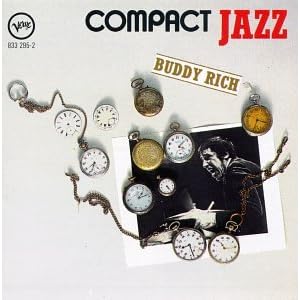 Every jazz drummer is worth about a dozen rock drummers. There are exceptions (Bill Bruford, Gary Peterson) but not many. My friend Joe L gave me a demo once. He said can you play one rhythm with one hand and different rhythm with the other? I said that’s not possible, and he proceeded to demonstrate that it was possible indeed.
Every jazz drummer is worth about a dozen rock drummers. There are exceptions (Bill Bruford, Gary Peterson) but not many. My friend Joe L gave me a demo once. He said can you play one rhythm with one hand and different rhythm with the other? I said that’s not possible, and he proceeded to demonstrate that it was possible indeed.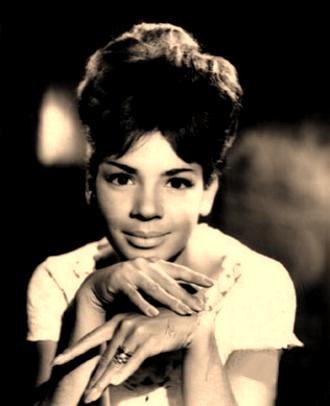 Say “Shirley Bassey” and the response, if there is one at all, will be “Goldfinger.” It was Shirley Bassey who wrote the last word on Bond themes, back in ’65. And Goldfinger gave her her only real North American hit. She had three more in the early 70s, none of which made it past number 48, and which included Diamonds Are Forever, putting her back into the world of 007, though its relative failure to capture the pop charts may have been an indication that the spy’s cachet was falling. It was, after all, to be Sean Connery’s last fling in the role (ok, not counting Never Say Never Again).
Say “Shirley Bassey” and the response, if there is one at all, will be “Goldfinger.” It was Shirley Bassey who wrote the last word on Bond themes, back in ’65. And Goldfinger gave her her only real North American hit. She had three more in the early 70s, none of which made it past number 48, and which included Diamonds Are Forever, putting her back into the world of 007, though its relative failure to capture the pop charts may have been an indication that the spy’s cachet was falling. It was, after all, to be Sean Connery’s last fling in the role (ok, not counting Never Say Never Again).
